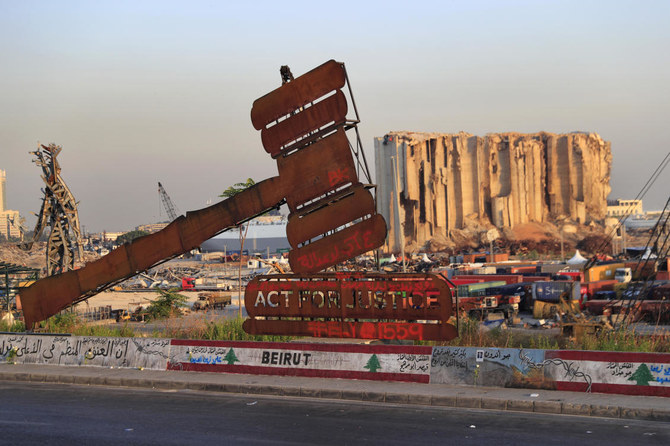by english.alaraby.co.uk — Lebanese authorities seized 20 tons of ammonium nitrate in an eastern region overnight on Saturday, local media reported. The ammonium nitrate was seized in a police raid from a warehouse used for the sale of agricultural fertilisers in the city of Baalbek, belonging to someone whose full name was not identified, the […]

By Becky Anderson, Zeena Saifi and Mostafa Salem, CNN — New Prime Minister Najib Mikati urged Lebanon’s people to put their trust in his government as he seeks “quick fixes” to help his economically shattered country. In his first interview with an international media outlet since forming a government a week ago, Mikati acknowledged that some Lebanese would struggle to put their faith in him and his government after so many politicians have failed them in the past. But, he told CNN, it is “time to have a government” to take decisions and end the country’s political vacuum, before elections that are planned for next May. “I’m doing the quick, the quick fixes that (need) to be done immediately, especially energy, health, education, work and transparency, and show the Lebanese that there is a governance. There is a transparency. That’s what we are trying to do. And hopefully it will take,” he said. He did not clarify how he would carry out these fixes. Mikati, a billionaire who served previously as caretaker prime minister in 2005 and 2011, heads a cabinet that will preside over an economic depression which the World Bank considers one of the world’s worst since the mid-19th century. And while there are new faces in the government, many have been handpicked by the same political establishment and groups blamed for the corruption that led to the country’s economic breakdown.
One of the most urgent economic issues facing the new government is the country’s expensive subsidies program. The Lebanese government increased oil prices by more than 37% on Friday, as the country continues removing subsidies on imports in an attempt to attract international monetary aid. The decision is expected to increase prices for the Lebanese people, who are already struggling with soaring poverty levels. But according to Mikati, some 74% of more than $10 billion dollars in subsidies was “misused by traders, by corrupt people” in Lebanon over the past year — and the program is unsustainable. “The subsidies are almost lifted because we don’t have any more cash or reserves to subsidize oil or other commodities,” Mikati told CNN. “We are going to keep the subsidies on medicine, but subsidies on other commodities will be lifted.” It is important to end the subsidies to start negotiations with the International Monetary Fund, World Bank and the international community, Mikati said. Lebanon’s Central Bank issued a statement last month saying that the fuel subsidies were being exploited by businesses. Around $800 million was paid in import subsidies in July alone, yet fuel shortages were still rampant.

by foreignpolicy.com — Anchal Vohra — Lebanon’s unprecedented economic crisis, which has plunged the country into darkness and ushered 78 percent of the population into poverty, has no shortage of authors. The country’s political elite and its sectarian factions have been more occupied with infighting over their traditional privileges than addressing the country’s problems. On Sept. 10, after more than a year of waiting, the country received a new, ostensibly independent, government, under Prime Minister Najib Mikati. But there is little indication it will has the will or ability to pass necessary political or economic reforms. As the country’s economy continues to crash, the hopes of many Lebanese citizens are increasingly invested with the United States. Only Washington, so the prevailing thinking goes, has the power to arrange for an economic lifeline while forcing the political changes Lebanon needs—and the democratic principle to ensure that such changes are truly democratic, by disempowering sectarian political actors and their regional sponsors alike. Unfortunately for Lebanon, the United States has no active plan to rescue the country—nor is there any indication that one is in the works.
Until now, the United States has only offered ad hoc support, doing the minimum to keep the country from utter collapse. Instead, it has outsourced the Lebanon file to France. Over the last year, France took a lead in trying to resolve the crises in its former colony, and French President Emmanuel Macron visited the country several times after the August 2020 Beirut port blast to push for a new social contract between the Lebanese state and the people. The French plan, however, naively banked on the same political elite that benefited from the country’s sect-based power-sharing plan to reform that same system. There was no stick, no threat of repercussions to encourage a very stubborn—and allegedly highly corrupt—ruling class to change its behavior.
As disillusionment with the French set in, many analysts said France simply did not have the kind of influence the United States does to coerce a haughty and unrepentant political elite into action. But they are disheartened at America’s apparent lack of interest. “Lebanon is not the Biden administration’s priority,” said Sami Nader, a Lebanese political analyst. “Israel’s security is on top of their agenda, reviving the deal with Iran is on top of their agenda, but Lebanon is not.” Nader reminisced about a time when Lebanon was a priority for Washington: “During George W. Bush’s time, mid-2000s, Lebanon topped Washington’s agenda, because he saw the first success of his democracy agenda policy in Lebanon, and we saw a lot of hope and support at all levels. Not anymore.”
ان تشكيل الحكومة وانجاز البيان الوزاري ادى الى هبوط سعر الدولار بالنسبة لليرة اللبنانية وهذا امر جيد يسمح للمواطن بالتقاط انفاسه ويحدّ من التضخم والامل ان يستمربالتراجع الى الادنى. ولكن وقف الانهيار الاقتصادي لا يبدأ الا بعودة عجلة النمو الاقتصادي وارتفاع معدل هذا النمو، ما يتطلب تصويب السياسة العامة الداخلية والخارجية واستعادة سيادة الدولة على […]

by arabnews.com — BEIRUT: The judge leading the investigation into the August 2020 Beirut Port blast issued an arrest warrant on Thursday for the former public works and transportation minister Youssef Fenianos, after Fenianos failed to appear for questioning. Judge Tarek Bitar has also subpoenaed former Prime Minister Hassan Diab, who was the premier at the time of the port blast, and has demanded that parliament lift the immunity of three MPs — Nohad Machnouk, Ghazi Zeaiter and Ali Hassan Khalil — in addition to a number of security officials he is keen to question. Diab stepped down as caretaker prime minister and left the country when Prime Minister Najib Mikati took office earlier this month. Social media was abuzz with the news of Diab’s departure, with many speculating that he would not return for his scheduled questioning on September 20. Diab reportedly travelled to the US to visit his children, whom he had not seen for two years, before receiving Bitar’s subpoena, which was issued on August 26. A judicial source said that the discriminatory Attorney General, Judge Ghassan al-Khoury — the judicial public prosecutor in the investigation, referred the subpoena against Diab to the General Directorate of the Internal Security Forces for implementation.
Bitar issued another subpoena against Diab on Sept. 14, this time including the address of his residence in Beirut. If Diab fails to return before Monday morning, then the judge would have the right to issue a warrant for his arrest. In response to the arrest warrant for Fenianos, who is affiliated with the Marada movement but is not currently an MP and therefore does not have immunity, the head of the Marada movement, Suleiman Frangieh, tweeted: “We reiterate that we stand by Fenianos, who has the right to defend himself.” Bitar is facing pressure from all sides of the political spectrum. Hezbollah Secretary-General Hassan Nasrallah accused the judge of “playing a political game.” Bitar’s predecessor in the case, Judge Fadi Sawan, was relieved of his duties as a result of political pressure when two of the former ministers he had charged with negligence for the disaster had their request for his removal from his post granted by a court. Many see the subpoena against Diab as a measure of how seriously the new government is taking the investigation. If Diab is allowed to continue to evade questioning from Bitar, and if the newly formed government’s parliament refuses to lift ex-ministers’ immunity, then there seems little hope of justice for the victims of the blast and their families.

by english.aawsat.com — The European Union should still consider imposing sanctions on Lebanese politicians who block the progress of the new government, the EU’s parliament said on Thursday, calling Lebanon’s crisis a man-made disaster. This week, EU foreign policy chief Josep Borrell told the European Parliament that, while Lebanon’s economic model was broken, the moment for sanctions had passed because politicians formed a government on Sept. 10. Taking note of Lebanon’s formation of a government after more than a year of political deadlock, the European Parliament in Strasbourg issued a resolution saying EU governments cannot yet release pressure on the country. The parliament voted 575 in favor, 71 against and with 39 abstentions, Reuters reported.
The parliament “deeply urges Lebanese leaders to keep their promises and be a functional government”, the parliament’s resolution, which is non-binding, said of Lebanon’s new cabinet that has vowed to tackle one of the world’s worst economic meltdowns in history. EU lawmakers warned: “the introduction of targeted sanctions for obstructing or undermining the democratic political process remains an option.” The EU agreed in June to prepare travel bans and asset freezes for Lebanese politicians accused of corruption and obstructing efforts to form a government, financial mismanagement and human rights abuses.
الأحد 12 أيلول 1982 اتّصل بي الرئيسُ بشير الجميّل يَسألُني إذا كنتُ أنهيتُ خِطابَ القسَم الذي كلّفني إعدادَه. تواعَدْنا على اللقاءِ في دارتِه في بكفيّا التاسعةَ من مساءِ الاثنين 13، أي عشيّةَ استشهادِه. وصلتُ، فوَجَدْتُه جالسًا في الصالونِ الداخليِّ مع زوجتِه، السيدة الأولى صولانج (صولا)، يَستمع إلى موسيقى كلاسيكيّةٍ عبرَ آلةِ حديثةٍ أهداه إيّاها أحدُ أصدقائه. ولأنّه لم يكُن تعلَّمَ تشغيلَها بعدُ، راح يَكبِسُ على أزرارِها علّه يُحسِّنُ الصوت. بَقينا هكذا بِضعَ دقائق، ثم ما لبثَت زوجتُه أنْ تَركتْنا، وأتى بشير بغليونٍ كان يُدخّنُه في الجلساتِ الحميمةِ حَصْرًا، وهي نادرة. فهو لا يُدخِّن، وإذا ما نَدَر أنْ أشْعلَ سيجارة، يَتركُها شاعلةً ولا يُدخّنُها، حتّى تنطفئَ وحدَها.
جَلس رئيسُ الجمهوريّةِ المنتخَب على كرسيٍّ جِلديٍّ قديم، وجَلسْتُ قبالتَه حولَ مِدفأةٍ مُطفَأة. وما إِن بدأتُ قِراءةَ الخِطاب، وأنهيتُ الفقْرةَ الأولى منه (“أديّتُ مضمونَ القسَم، وها إنّي أتلو نَصَّه. أدّيتُ مضمونَه طوالَ ثماني سنواتِ المقاومةِ، وأتلو نَصَّه في بَدءِ ستِّ سنواتِ الحُكم”)، حتى قال لي: “أَعِدها”، فأعَدْتُها، وارتاحَ في نهايتِها إلى ضحكةٍ طويلةٍ خَتمها بقولِه: “لئيم، فظيعة، اخْتصَرْتَ كلَّ شيء”.
ان عدم تدخل الدولة لضبط موضوع استيراد النفط الايراني من النواحي القانونية والادارية والتقنية يخشى ان يؤدي الى فوضى تجارية في الاسواق غير مسبوقة … حتى ولو انه يوفر لبعض الوقت على بعض الناس ويلبي بعض الحاجات

theowp.org — The economic crisis in Lebanon has made fuel a scarce commodity, leading to blackouts across the country as the population adjusts to life without electricity. This economic crisis erupted in 2019 as the result of corruption, mismanagement, and sustained policy inaction. According to the World Bank, the crisis has become one of the three most severe economic catastrophes since 1850, with Lebanon’s currency sinking 90%. The lack of power also has had unprecedented implications for human security. Imported fuel reserves have dried up, paralyzing life in Lebanon. To power the country, “Lebanon needs around 3600 megawatts,” said Diana Kaissy, a board member of the Lebanese Oil and Gas Initiative and energy governance expert. “We are currently producing 700 megawatts,” she said – less than 50% the necessary amount. With this output, state electrical company Electricité du Liban is only able to produce approximately two hours’ worth of energy per day, with electricity being totally shut off in some parts of the country. Privately run diesel generators are left to cover the remaining 22 hours.
The energy shortage has had devastating consequences for the healthcare sector. Suleiman Haroun, head of the private hospitals union, said, “Hospitals are going day by day, very few have enough [power] for 2 or 3 days.” The American University of Beirut Medical Center added that it was “facing imminent disaster due to the threat of a forced shutdown” starting on Monday morning. And if shutdowns become a reality, “forty adult patients and fifteen children living on respirators will die immediately.” Hospital patients are not the only ones facing a bleak outlook. “We have only one hour of electricity a day, and six hours of generator cuts a day, so I don’t have anything in my fridge because I can’t stock food,” says Patricia Khoder, communications and media manager at CARE Lebanon. “I can no longer bear to go to the supermarket because I cannot see people crying because they can’t buy food.”
These are the short-term effects of Lebanon’s energy crisis: hospital and business closure, water shortages, and food insecurity as people are unable to use refrigerators. However, the crisis also comes with multi-faceted long-term effects. First, it has the potential to create an education gap, as students are unable to find transport to school or to access power-dependent online learning. (COVID-19 has exacerbated this issue.) Second, the inability to maintain supply lines and equipment may create an infrastructural deficit. This inability to reconstruct and rebuild poses an acute threat to Lebanon in the wake of the Beirut Port Explosion, which affected 163 public and private schools and rendered half of the city’s healthcare system non-functional, in addition to damaging the port itself, which previously handled 70% of the country’s imports. Third, the power failure will drive up wealth inequality. The rich can afford privately run energy services. The poor must go without.

By Hazem Saghieh — english.aawsat.com — Those following the Syrian and Lebanese-Syrian news over the past few weeks notice two tendencies: the first is what is happening in Syria and can be summed up in the following events: As Russian aircrafts launched strikes on rural Idlib, six of them according to the Syrian Observatory for Human Right Observatory. These same Russians sponsored talks to bring Daraa back to the regime’s embrace. Destruction and forced displacement, which are part and parcel of Moscow’s “diplomatic activity,” stirred fears of Iranian militias and Lebanese militias loyal to Iran replacing Daraa’s original inhabitants. Their entry into Daraa al-Balad on September 9 for the first time since 2013 ended a siege that had begun early this summer, while the regime had recaptured Daraa’s surroundings two and a half years ago. Thus, the south of “useful Syria” was captured and nothing remains but extending control to the north of “useful Syria,” Idlib.
Syrian regime forces and their allies’ advances were accompanied by another event: Amnesty International issued an extensive report on sexual violence in Syrian prisons and border crossings. This time, it is the Syrians who believed Bashar al-Assad and Gebran Bassil’s claims that they could “return to the embrace of the homeland” who were the victims. Amnesty International documented 66 cases of men, women and children being assaulted by security officials, including 13 children between 3 weeks and 17 years of age, 15 women and 38 men. The report was not given the title: “You are Going to Syria.” A more eloquent and accurate title was given: “You are Going to your Death.”
Meanwhile, as news about Rami Makhlouf died down over the past few weeks, news about Rifaat al-Assad returned to the fore. He was sentenced to four years in prison for embezzlement and fraud after having amassed a fortune of around 70 million euros divided between apartments, mansions and horse stud farms. For those who have forgotten, Rifaat is Bashar’s uncle and Hafez’s brother and partner in power for the first half of the latter’s reign (1970-84). He is among the most prominent if not the most prominent architect of Hafez’s bloody reign, especially with what he did in Palmyra in 1980 and in Hama in 1982. His dispute with his older brother was only about inheritance. Beyond that, “blood does not turn into water.”



